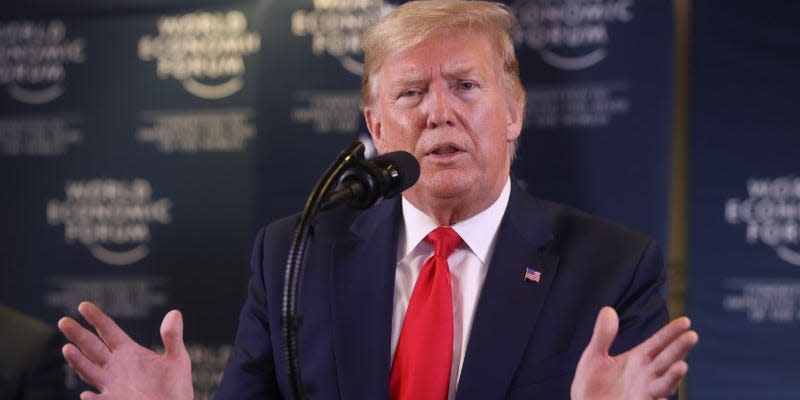Trump says reforming Social Security and Medicare is 'the easiest of all things' as he appears open to cutting entitlement spending

Reuters
President Trump appeared open to cutting entitlement spending on Social Security and Medicare in a CNBC interview on Wednesday.
He said a reform effort could occur at the "right" moment and appeared to credit the economy for providing momentum.
Any attempt to cut spending on either program would be a break from his 2016 campaign pledge to preserve Social Security and Medicare.
President Donald Trump left the door open to overhauling Social Security and Medicare in a CNBC interview on Wednesday, calling any attempt to rein in entitlement spending "the easiest of all things."
Trump is at the World Economic Forum in Davos, Switzerland, and he's touted a message of economic resurgence at the elite gathering of wealthy investors, business titans, and academics.
In the interview, the president said entitlement reform could happen at the "right" moment and appeared to credit the strength of the US economy for providing momentum to shrink spending on two of the nation's biggest government programs.
"At the right time, we will take a look at that. You know, that's actually the easiest of all things, if you look," he told CNBC's Joe Kernen.
Trump added: "We also have assets that we've never had. I mean, we've never had growth like this."
Trump's CNBC interview, however, provided few details and little clarity on what shape entitlement reforms could take. While it's proved resilient, the US economy is far from the best it's ever been, despite Trump's claims on Wednesday.
White House spokesperson Judd Deere defended the administration's position on entitlements, saying, "With no benefit cuts, President Trump is keeping his commitment to the most vulnerable Americans especially those who depend on Medicare and Social Security."
He added: "His budgets have proposed more savings to mandatory programs than any president in history, including lowering drug costs, eliminating waste, fraud, and abuse, and getting people off welfare and back to work."
Trump recently showed disdain for attempts to rein in the swelling federal deficit, telling donors at a Florida fundraiser, in audio leaked to The Washington Post: "Who the hell cares about the budget? We're going to have a country."
Any initiative to cut spending on Social Security and Medicare would be a break from his 2016 campaign pledge to protect funding for those programs. In his formal campaign announcement, Trump said: "Save Medicare, Medicaid, and Social Security without cuts. Have to do it."
Social Security and Medicare represent a substantial chunk of government spending, and they constituted 40% of the federal budget in 2018. The former program makes up nearly a quarter of all federal expenditures.
Both are highly popular among voters. A Pew study in December 2018 found that most Americans believe no cuts should be made to Social Security. Another poll from Public Policy Polling released last March found that 72% of voters opposed reducing Medicare benefits.
It's a key reason that lawmakers have largely kicked the can down the road on addressing the rising price tags of Social Security and Medicare, and calls for reform still encounter resistance from both Republicans and Democrats.
The Congressional Budget Office has projected that both programs will cost $30 trillion over the next decade, an outlook that some experts say could worsen as a result of the 2017 tax law that means fewer tax dollars are collected from the richest Americans and corporations.
Trump's 2019 budget proposal sought to slash spending on safety-net programs by $1.9 trillion. It pushed for spending $26 billion less on programs related to Social Security — which mostly benefits older Americans — and shaving future spending from Medicare and Medicaid.
In recent days, the Democratic presidential candidates Sen. Bernie Sanders and former Vice President Joe Biden have traded blows over entitlement programs, particularly regarding the latter's comments about cutting Social Security while he was in Congress.
Read the original article on Business Insider

